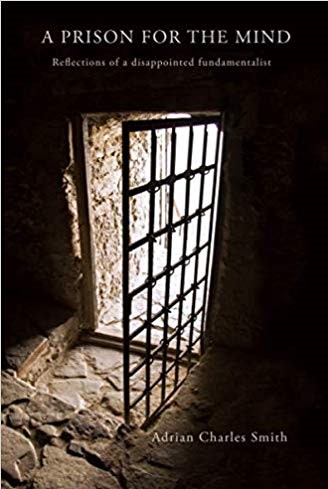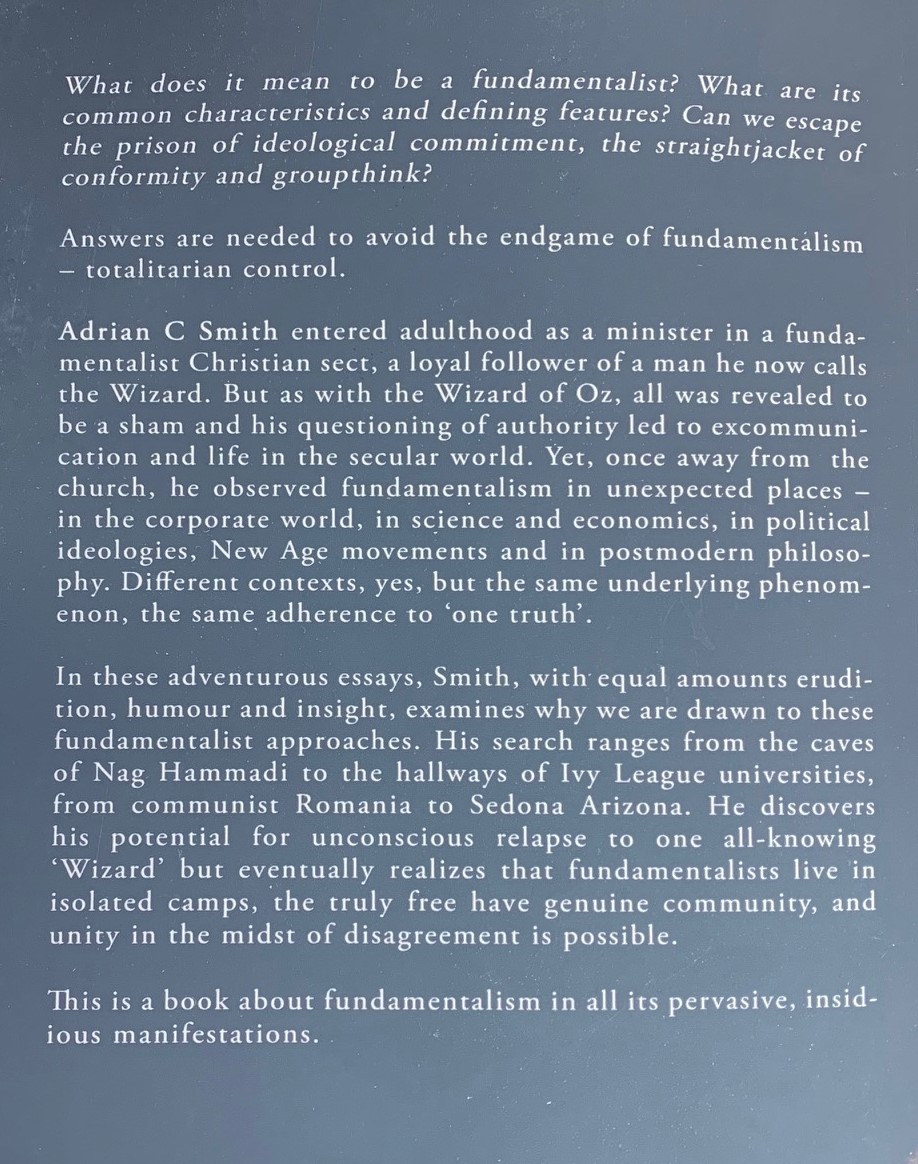|
home | what's new | other sites | contact | about |
||||||
|
Word Gems exploring self-realization, sacred personhood, and full humanity
Attorney Adrian Smith
Editor's note: The video version of the interview can be seen here: https://staging2. The following are direct quotes from Adrian:
fundamentalism is a power play - by the organizers, not by the followers Let me tell you how I use the word fundamentalism, in the context of the book… It is inextricably linked to the use of power. And in the exercise of power the fundamentalist will attempt to link a religion to the exercise of power – in order to give [the exercise of power] a pious face… to give themselves a legitimacy, because they [posture to be] morally superior, enlightened beings. the mask of piety; subtitled, 'how can we fool'em today' So, it’s seizing the moral high-ground. I would see fundamentalism as being an empty shell. It is [to use a biblical phrase] the “form of godliness” without the content, zero content – the empty vessel. And we can see the template of this in the Pharisees in the New Testament. [The essence of fundamentalism] repeats itself, and continues to repeat itself [down through history, in many guises]… this isn't about the average church-goer Fundamentalism is not confined to those who take the Bible literally, I’m not talking about your average church-goer [when I speak of fundamentalism] or even the average church-goer who [does] take [the Bible] literally because there’s usually some moral content in what they are [doing or believing]. the counterfeiting spirit There’s a phrase in “The Secret Book Of John” [one of the Gnostic documents]… and it means “counterfeiting spirit” … but there’s more to the phrase than that, inversion it’s a counterfeiting spirit … that is like an inversion [that is, going contrary to it]. It [adopts] the form [of what it’s counterfeiting; for example,] a religion. Take Constantine and Christianity: Constantine adopts Christianity as the official religion of the Roman Empire, but then inverts it. So, the “Prince Of Peace” becomes an instrument of empire or conquest… [Constantine’s religion] takes to itself a pious face, [and this] justifies exterminating the Cathars or laying siege to cities. And [the average person] cannot see what’s happening, all they see is the piety, [and so] people say, “It must be right, it must be good, because how could this be happening [if there were no] reason for it, [how could this great pious] religion support such [atrocity]?" It reminds me of the Milgram experiment… Editor’s note: From Wikipedia: “The Milgram experiment on obedience to authority-figures was a series of social psychology experiments conducted by Yale University psychologist Stanley Milgram.” Dear Leader said it's ok to kill people, and so we're just obediently following orders It was an experiment done with [supervisors directing lab workers] in white coats administering electrical shocks to people who were asked a series of questions, and if they got the question wrong an electrical shock would be given. [Those answering the questions were actors who feigned screaming, and so were not actually harmed as the shocks were not real]… But an amazing number of [lab workers] delivered what would have been lethal amounts of electricity [had the shocks been real]. But [the lab workers] were told “don’t worry, everything’s alright,” and so they delivered the lethal voltage because they [told themselves] “it’s coming from an authoritative source.” Editor's note: This absolving oneself of responsibility if Dear Leader says it's ok is addressed by the great psychologists as "the divine numen," the approving "nod" from on high. See it in the "group think" article. And so this is what’s happening with fundamentalism, and the religion it adopts, as it gives itself this moral high-ground, it’s all about capturing the moral high-ground. [But I have come to see that] fundamentalism is related to areas outside of religion. It could be the fundamentalism of [materialistic] science, or it could be a fundamentalism of political doctrine, or economic doctrine, or most recently, I would say, Post-Modernism: the 'mother of all cults' what it is the “mother of all cults” is the Post-Modernist religion, and here again we will be able to see [the current] Post-Modernism as an inversion of the original Post-Modernist philosophy. But Post-Modernism, to put it in a nutshell, is that there’s no such thing as objective reality, there’s no such thing as truth, that everything is a person’s perceptions, that there is no reality to be discovered. Whereas the Enlightenment philosophers – John Locke, David Hume, the Age Of Reason – the basic assumption there was that there is an external reality to be discovered, and it is discoverable, by reason and debate and the scientific method, or, in legal terms, the rules of evidence in court – there’s a truth out there to be discovered, but the today’s Post-Modernists have taken [a concept] that originally had some sense to it – that, we don’t necessarily discover the world by reason alone, but by intuition, and our own mystical experiences; these are avenues to truth, as well – but the [neo]Post-Modernists have inverted it to say “there is no truth at all.” Whereas the Gnostic would say “while there are many paths up the mountain, and you can blaze your own path up the mountain, there’s still a mountain, it’s the same mountain.” the Sufi elephant Or, there’s a well known Sufi story from the 12th century about a group of blind people trying to figure out what an elephant is. One person would feel the ear and say it’s like a velvet carpet; another would feel the trunk and say no, it’s a hollow pipe; yet another would feel the leg and say it’s a pillar - but no one has the vantage point to see the whole elephant. But, a valid form of Post-Modernism would say, “there’s still an elephant, there’s a whole elephant waiting to be discovered,” even if no individual can access it all. [Neo]Post-Modernism does not allow for that, it would say, “there is no elephant.” But if you take this [radical] view of [neo]Post-Modernism, which says, “there is no truth,” then – there can be no lies! – there can be no lies! So, what you find is that people who adopt this philosophy lie so much because anything they can say is automatically true! – because it’s true for them! So, you cannot actually reason [with them], you cannot engage in a debate, because they don’t believe in it, because everybody has their own truth, you see. There’s nothing to be discovered here. character assassination is the only argument they have You cannot really engage in a debate with a Post-Modernist because they will immediately go to denunciation. Editor's note: On the "Clear Thinking" page we said this was the "last resort rule" of attorneys, you pound the table and vilify opposing counsel when your case is weak, [Because] there’s no such thing as truth [they say], there’s no use talking [or discussing anything, because only our view is valid]. So, what you’re left with [when you speak to a Post-Modernist] is a power struggle. It’s all power relations. It’s all about oppressor versus oppressed. They understand things only in those terms, so their idea is to get [control of the] power in the situation. You may have noticed in a so-called debate between a Post-Modernist and someone [who is not], from the get-go, [the Post-Modernist launches into] denunciation. So, one of the characteristics of fundamentalism that I allude to is the demonization of the opposition. They instantly go for the demonization of the opposition. And words mean whatever they say they mean. So, “violence” can mean anything. It can mean “what you said upset me, therefore it’s violence.” And with this pervasiveness of Post-Modernism, you’re even seeing it creeping into the law. 'hate-crimes' were invented by Post-Modernists I refer [in my book] to perception-based recordings of hate-crimes. So, if someone perceives you as hateful, in order to uncover the “hateful” element of a hate-crime, you are not to challenge the person making the accusation because that is their reality. So, with that there is a subversion of the legal process, you see, because someone has made an accusation is automatically right, so this idea of “innocent until proven guilty” is being eroded away by the pervasiveness of Post-Modernism. So, fundamentalism is all about attaching itself to political power – there’s nothing new in it. And it didn’t begin with the Pharisees. [We find it in all temple-priest-king triads throughout history.] 'we promise utopia, if you'll just do what we say' Another common characteristic of fundamentalism is the utopian vision… [They always speak] of a coming golden age [which] can be ours [they say] if only we will sign up for the utopian agenda [by the Dear Leader of the moment. All utopian visions are based upon the requirement, “If you’ll only do what we say, if you’ll just obey us and surrender your personal freedoms, we’ll lead you to the promised land”.] The interviewer comments: "Wow! So, this is really the fundamental issue of our time – whether we can identify this, understand its nature, and set up some checks and balances to avoid this happening again."
|
||||||
|
|

